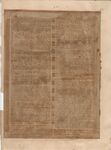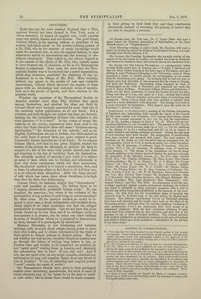< Spirit Photography in the Dark – Manifestations with Mme. Blavatsky (continued from page 4-200) >
letter-paper in which he had carefully folded it in its smooth unruffled condition. She at once made a careless twist of it and tied it round her neck. When we returned from the dining room to her warmer snuggery of a parlour, she took it off and threw it on the table by her side. I remarked, “You treat in very unceremonious fashion that beautiful handkerchief which has been sent to you all the way from Thibet. Since you can get them so easily, have you any objection to give that one to me?”—“Oh, certainly not, if you would like to have it,” and she tossed it over to me. I smoothed out its creases as well as I could, again wrapped it in a sheet of paper, and put it in my breast pocket. Later on, as I was taking my departure, and we were all on foot, she said, “Oh, just give me that handkerchief for a moment.” Of course I obeyed. She turned her back to me for an instant or two, and then, turning again to me, she held out two handkerchiefs, one in each hand. “Take whichever you please; I thought that perhaps you might prefer this one (handing me the new one) since you have seen it come.’’ Of course I did so, and after travelling about fifteen miles by rail that night, I gave it to the lady best entitled to receive a favour thus conferred upon me by another lady, which latter lady, by the way, claims to be septuagenarian, though looking only about forty. When I left America, a few days afterwards, it had not yet melted away, nor wafted back to Thibet, on a “current of astral fluid.” I should add that the second handkerchief was a perfect fac-simile of the first, down to every detail of the name in ancient oriental characters; which, by the way, was evidently written or painted in some black pigment or ink, not stamped mechanically.
And now I come to the reason why I recall these reminiscences of nearly a year ago, in connection with John King’s protest against having stolen out of shops the above-mentioned flowers and confectionery, and of his having, as he said, “reproduced them from the essence of the things.” In the course of the evening with Madame Blavatsky (this was before the reproduction of the second handkerchief), I had referred to the anterior phenomenon of the beads of the chaplet, and asked Madame Blavatsky whether they (the “Adepts” of the Orient) claimed that they can make matter— create real, palpable, ponderable objects—out of nothing. “No,” she answered, “that is impossible. There must be a basis, a first object. Then it can be reproduced.” Is not this (I would ask) something like John King’s making his flowers and confectioneries “from the essence of the things,” such as they already existed in material reality in the hothouses or in Sirandin’s shop in the Rue de la Paix? And does it not suggest any glimmer of light upon the practical modus operandi through which five loaves and two small fishes were once (by an extraordinary Virgin-Born Messiah-Prophet of the Most High Supreme) made to feed a mighty multitude who were an hungered? Is there a power in spirit under the control of great supernal authority, to concrete into what we call Matter the spiritual “essence of things”? Or to gather out of universal nature, the air, electricity in its diverse forms, terrestrial and animal magnetism, human organisms, &c., the elements for the concretion of what we call material objects? And to do it by a flash of thought, by a wave of will? Does this throw some light on the phenomenon (now so familiar to us here, and to so many others everywhere else) of the materialisation of spirits?
But paulo minova canamus. My particular business in this correspondence is to record and testify to plain, honest, simple facts—facts patiently and keenly observed by three calm, cool, and critical minds. I like to feel terra firma under foot. Let my friends and brother Spiritualists over there in England fill splendid columns of your large type with essays on their observations of psychic things in general, viewed from balloon altitudes, to which I humbly decline to soar. Let psychic eagles stretch pinions made of fine-writing quills, out of sight towards the sun (beware of landing in the moon!). I am a more humble terrestrial bird. They may call, or think, me a goose if they like: the least flighty of birds. In other words, I am an old-fashioned Spiritualist (what, are we already, some of us, “old-fashioned”?). I believe in the possibility, and in the fact, of our continued communication with our loved and (not) lost. Nay, I do not merely “believe” in that—I know it, if I know anything; if I may be said {pace the metaphysicians) to know that I have ten fingers and ten toes, and that two and two make four.
I have had evidence of that great fundamental truth—evidence demonstrative and conclusive—to the most critical, and the most severely logical, mind. Therefore, I am sure that I too shall live again; that my continued life will depend upon what I make this one; that “death” is only evolution, like that of the butterfly (the psyche) from the caterpillar. And therefore, and therefore, and therefore, and a great many divine therefores, hang, in an endless succession, reaching from earth to heaven, upon that first inductively established truth, which is indeed the pearl of great price, for the dear sake of which alone I attend good stances, and write the record of them to The Spiritualist, for the benefit of those readers who like facts as well as I do, and as much as Goethe said he hated them.
Paris, Jan. 27.
Occultism
Some time ago the news reached England that a Theosophical Society had been formed in New York, some of whose members, by means of magical arts, could exercise sway over spirits, human and sub-human. Our good friend, Colonel Olcott, in his opening address as president of the society, laid much stress by the wonder-working powers of a Mr. Felt, who by the exercise of occult knowledge would teach the members how, in true old magical fashion, to raise elementary spirits by incantations and the burning of odoriferous compounds. Time rolled on, but silence reigned as to the success of the efforts of Mr. Felt, who, indeed, seems to have dropped out of existence, so far as the Theosophical Society is concerned. Next came the news that the Theosophical Society was to be resolved into a secret organisation, which step, moreover, precluded the obtaining of any information as to the doings of Mr. Felt. More recently, without any appeal to the results of new and verifiable observations, Colonel Olcott favoured the readers of these pages with an interesting and elaborate series of speculations as to the nature of spirits, and their relation to the material world.
Whether the members of the Theosophical Society in America number more than fifty, whether they agree among themselves, and whether the ideas put forth by Colonel Olcott were formally endorsed by more than two of the members before publication, we do not know. But a coherent and well-thought-out system has been put forward, leaving, for the consideration of those who examine it, the vital question—“Is it true?” In the course of recent discussions on the matter, expressions have been used to the effect that these Occultist ideas will cause “divisions among Spiritualists,” “the formation of two schools,” and soon. English Spiritualists are not so foolish; but while united on the solid basis of proved facts, are quite content to good-temperedly discuss speculations of all kinds. So we request Colonel Olcott, now that he has given English readers the outline of the system he advocates, to produce his facts in support of a few of the more vital points thereof, and thus put inquirers in the way of verifying them for themselves. The scientific method of proving a new truth is to adduce an array of facts which can be verified, and afterwards to draw only those conclusions which the facts necessitate, The theological method is to launch a speculation first, and to leave its adherents either to find facts to fit it if they can, or to do without them altogether. After the large amount of talk which has taken place about Occultism, it is high time that the facts were forthcoming.
Colonel Olcott, for instance, alleges that “elementaries” exist and manifest at seances. He defines them to be “impure, disembodied, perishable human souls.” He has launched the assertion; but where is the evidence of the perishability of any portion of each being so communicating? He offers none. By the positive method, he would be required to give—say, a dozen indisputable and verifiable facts, which admit of no other conclusion but that the alleged perishability is unquestionable. Can we not have this point briefly cleared up by him first, and if no evidence exists to demonstrate it at present, can he select any other cardinal doctrine of Occultism which he is prepared to demonstrate by facts, instead of to promulgate by assertions?
Madame Blavatsky, in her interesting and valuable writings, tells us much about adepts having power to leave their own bodies, and to obtain information by the visits of their spirits to distant persons in distant places. May we ask whether her well-known Occultist friends in London now go through the labour of writing long letters to her, or whether time and trouble to all concerned are avoided, by her “astral spirit” visiting them in London, and obtaining the information face to face? If not, why not? And if not, has her spirit ever, on any single occasion, obtained any information in long and complete detail, from any friend of hers in London? If not, do adept ship and magical powers “work” outside the realm of words?
Our Transatlantic friends have given to their privileged readers some interesting speculations, the truth or error of which observers may in the future be on the alert to verify or cast aside; but in future there would be much economy in their giving us their facts first and their conclusions afterwards, instead of reversing the process, if indeed they are able to copmlete a reversal.
Editor's notes
- ↑ Occultism by unknown author, London Spiritualist, No. 285, February 8, 1878, p. 72. Some lost words and the ending were recovered by HPB.
Sources
-
London Spiritualist, No. 285, February 8, 1878, p. 72


